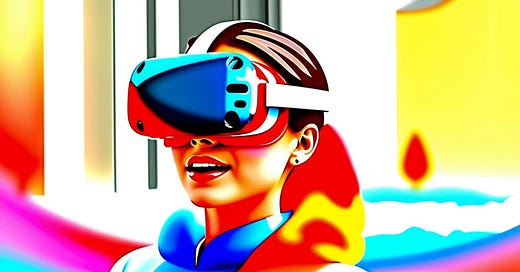Why Did They Do This Study?
Right now, doctors diagnose ADHD mostly by asking people questions or using surveys. But that’s not always reliable because:
People might not realize they have "symptoms" or might misremember them.
Some people "mask" their ADHD, meaning they consciously or unconsciously hide their "symptoms" to fit in socially. This is especially common in women and people assigned female at birth, who are often underdiagnosed.
There’s no medical test (like a blood test or brain scan) to confirm a person is ADHD.
There’s a lot more wrong with the diagnostic “categories,” but we aren’t going to get into it in this newsletter.
Because of these challenges, ADHD is often misdiagnosed or missed entirely. Researchers have been searching for more objective ways to identify ADHD. One promising approach is using Virtual Reality (VR) to track behavior in real time, rather than relying only on self-reports.
What Did They Do?
The team created a Virtual Seminar Room (VSR)—a virtual classroom where people did a focus-based task while being distracted by sounds and visual events. While inside the VR, the system measured:
✅ Where they looked (Eye Tracking)
✅ How much they moved (Head Tracking/Actigraphy)
✅ How well they performed on the task (Reaction Time & Accuracy)
✅ Their own descriptions of how focused or distracted they felt ("Self-Reports")
✅ Brain activity (EEG – measuring electrical signals in the brain)
They tested this on 86 people (some had ADHD, some didn’t) and used Artificial Intelligence (AI) to analyze the data and see if it could correctly predict who had ADHD.
What Did They Find?
🔹 VR + AI correctly identified ADHD in 81% of cases! That’s better than many current methods.
🔹 Brain activity (EEG) didn’t add much value, meaning it might not be needed in future tests.
🔹 Eye movements, head movements, and task performance were the most useful for diagnosis.
🔹 Asking people how focused or distracted they felt during the VR test ("Self-Reports") was surprisingly helpful!
Is This Part of a Bigger Trend?
Yes! Scientists have been searching for new ways to diagnose ADHD beyond just interviews and surveys. Some approaches that have been explored include:
🧠 Brain Scans (MRI, EEG) – Have shown some differences in people with ADHD but aren’t reliable enough for diagnosis.
📊 Computerized Attention Tests – Can measure focus but don’t reflect real-world distractions.
📍 Movement Tracking (Actigraphy) – Has been useful, but only when combined with other data.
🎮 Virtual Reality (VR) – Has been tested before in children with ADHD. Now, researchers are seeing if it works for adults too!
This study supports the idea that a combination of different types of data (behavior, movement, and self-reports) is better than relying on one test alone.
Is This Research Neurodivergent Affirming?
⭐ This research has neurodivergent-friendly aspects because it aims to help people who are overlooked by traditional ADHD tests. This is crucial for helping people get support earlier.
Why Is This Important?
✔ More Accurate Diagnosis – This could help doctors catch ADHD earlier and reduce misdiagnosis.
✔ More Objective – Instead of relying only on surveys, this tracks real behavior in a controlled setting.
✔ Faster & Easier – Without EEG, the test could take only 30 minutes instead of over an hour.
✔ Better Than a Survey – Some people don’t realize they are ADHD people, but this system detects "symptoms" in real-time.
Final Takeaway
This study proves that using Virtual Reality with AI can help diagnose ADHD in adults more accurately than just surveys or traditional tests. More research is needed, but this could be a game-changer for ADHD diagnosis in the future! 🚀
Reference
Aitken, B., Downey, L. A., Rose, S., Arkell, T. R., Shiferaw, B., & Hayley, A. C. (2024). Driving performance and ocular activity following acute administration of 10 mg methylphenidate: A randomized, double-blind, placebo-controlled study.
Journal of Psychopharmacology, 38(11), 998-1006. https://doi.org/10.1177/02698811241286715
I run ADHD support groups for women through my coaching practice and a therapy practice. I’ve been a therapist for 30 years this year!
Help me grow a neurodivergent affirming community where ADHD and AUDHD women can connect. Get off Facebook and make this more significant.
Thanks for reading my newsletter.
Please share it if you find it helpful.
Have a good week.
Kristen McClure






Thanks for sticking to the science.
Interesting study! Thanks for sharing it.